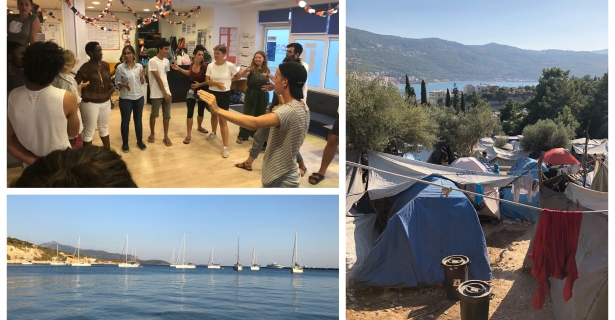The walk down from my last shift in the camp – kids’ reading circle – was without dramatic fan fair. The multilingual drone of human activity faded to the hum of cicadas. Soon, the smell of pine and dry earth won out over decaying food, sweaty bodies, spices, firewood, and human excrement. I said my goodbyes in the crowded and hot reception of Alpha; the click of plastic on wood from in-progress checkers matches populated the background. At the station, I could see the barbed wire unsuccessfully containing the humanitarian crisis unfolding on this small island. The web of tents and tarps and wire grew more distant as I headed towards the ferry and my bus turned up the sloping hills of Samos; the entire scene soon eclipsed behind hills dotted with terracotta shingles, once painted shutters, and faded green olive groves.
I have said my goodbyes - many were probably final - but nothing about the situation feels finished. Tomorrow at 8:45am, when I am on a plane flying home, Sofia and three others will go back to the camp, teach about the alphabet or body parts or colors. Hani will lead music class at 5:00pm and teach happy birthday to around three new, most-likely-Farsi-speaking students. She will do the same on Wednesday. Laundry – about 60 bags worth - will be washed. More tea will be made. Boats and their passengers will reach the pebbled shores of Samos only to be taken by the police and then sleep for months outside in tents of a camp eight times over capacity. Boats and their passengers will sink below the deep, blue Aegean. Some asylum seekers will receive their first or second rejections. Others will be granted residency only to meet the continued racism and poverty waiting in Athens. Maybe another stone fight or a stabbing will play out.
In other words, life on Samos continues. It was nightmarish and brutal before I came, and it will still be so once I leave. This persists. I see no end in sight.
So, as I leave comfortably on a ferry of Greeks and tourists and Greek tourists, I am faced with the question of what to bring back. What does my experience mean in the context of such a situation? How do I allow this to influence my thinking and actions once home? Should I feel guilty? Have I really done anything?
These questions are burdensome; but I very much recognize their weight stems from the ever unsettled and uncertain nature of the migrant crisis. The bureaucracy and geopolitics responsible for Samos as a hotspot are suffocating and monstrous. Alone, I have no power against such a force. No one does. I cannot give Mohammad a home, Hussain a job, Rostam a family, and Nelly a nationality. That powerlessness constantly fought to keep me down. I can not say ever day was a victory in that struggle.
However, retrospectively searching to contextualize my experience, hopelessness does not win out over other emotions. Maybe there is no other way forward. Maybe necessity mandates such a frame of mind, but I know that the uncertainty of the future does not negate the good done at present. The powerlessness to do everything does not mean you do nothing. If Brice receives his third and final rejection tomorrow, I will be devastated. But that does not mean teaching him piano or laughing with him over bee keeping was for nothing. Good remains good. A single act of good remains good regardless of the nature of the current or future reality. And it is only once you become overwhelmed by that uncertainty that you become lost. Every day on Samos, I was confronted with intense sorrow, but I also witnessed so many around me working so hard to build good.
That is what I intend to bring back from Samos. These horrors and shameful political actions persist; and that means so must we. I do not believe a single act or person can fix the world, but, fundamentally, it is not a battle to be fought in a single act or by just one person. It takes deliberate actions by each of us to direct a systems level shift. Inform yourself on the issue, do not look away, recognize your privilege in this crisis, and fight wholly against complacency. It is easy to feel overwhelmed in this scenario but giving into a sense of hopelessness seals the situation as hopeless.
No matter how small, good remains good and our privilege allows and encourages that we, with intention and stoic resolve, engender good in all we do.

